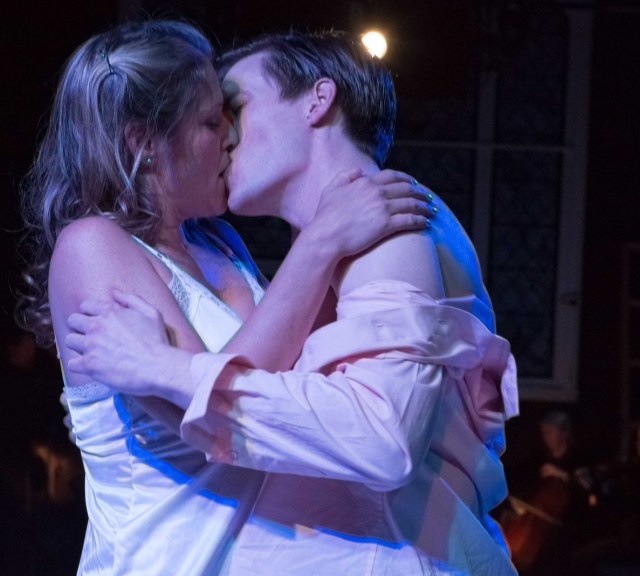The Motherf**ker with the Small Fire in the Piazza
For the fast-talking, hip-hop listening lovers who would rather laugh than cry and like courting the edge

John San Nicolas and the Hat
Image: Owen Carey
Stephen Adly Guirgis’s The Motherfucker with the Hat is a booty-shaking bass line on a sweaty dance floor, a back-alley drug deal, and a broken heart lost in between. It is bombastic, hilarious, and smart, and director Kevin Jones cranks its volume to full with a powerhouse ensemble and direction that is as tight as a Wu-Tang beat.
John San Nicolas is explosive and magniloquent as Jackie, a Puerto Rican man in New York’s Washington Heights neighborhood struggling to make a sober life for himself post-prison. He comes home to his coke-using girlfriend, Veronica (Diana De La Cruz as a stunning hurricane of words and emotion), after finally landing a job, only to find a mysterious hat in their battered studio apartment and a bed that smells of “Aqua Velva and dick.” The hunt for the headwear’s owner sets Jackie on a path that could quickly lead back to prison despite the best advice of his sponsor (the exceptional Victor Mack as a smooth-talking, blended nutritional beverage–drinking, manipulative AA zealot) and cousin (Gilberto Martin del Campo as a lonely, gay, iron-pumping, former sex-addict).
The Motherfucker with the Hat
Artists Rep
Thru Mar 30
Jackie’s and Veronica’s relationship is fueled and plagued by passion, addiction, infidelity, and instability, leading to a love that feels as elusive and unobtainable as the American dream is for these working-class, immigrant characters. Dark as it is, though, Guirgis’s script had the audience in stitches every other line. Like an August Wilson of the 21st century, he captures the spirit of a place and its people as they struggle to exist in a world beyond their reach, and he does it with a play that is as glittering and gritty as the lights of the New York skyline—from Wall Street to the Washington Heights’ projects. Rounded out by Val Landrum, the cast is at the top of their game, and everything from the interstitial scenes during the set changes to the mashed-up soundtrack coalesce into one of the best shows yet of the season.
For the romantics who believe in love at first sight (even if that means that sometimes it wears out)

Merideth Kaye Clark and Michael Hammack
Image: Brud Giles
The musical The Light in the Piazza takes us to a better-worn love story locale, Florence, with more recognizable love story faces: a Southern belle and an Italian lad. Compared to Portland Playhouse’s two previous musical forays (Bloody Bloody Andrew Jackson and The Hunters), Piazza is downright traditional, but that’s not to say it isn’t smart and lovely in its own way.
Margaret Johnson, played with Southern charm and American arrogance by Susannah Mars, has taken her daughter, Clara, on a seemingly innocuous trip to Italy. But Clara isn’t your usual 26-year-old. Due to a pony kick to the head at her 12th birthday (a weak premise even by musical theater standards), she is locked in the frozen mind of a child, and her mother is bringing her to Italy to escape some unfortunate romantic situations she naively attracted back home.
Of course, the first thing she attracts in Firenze is a handsome, young Italian who’s struck dumb with love and manages to maneuver past his lack of English and Margaret’s best defense to introduce daughter and mother to his family and quickly (oh so quickly) get Clara on the path to the cathedral.
Merideth Kay Clark (who starred as Elphaba in the first national tour of Wicked) is delightful as Clara, portraying a childlike innocence that swings easily from joy to despair, and her chemistry with Michael Morrow Hammack as Fabrizio is palpable in Portland Playhouse’s small theater, which has been stripped to its previous incarnation as a church, stained glass and all, to provide a most perfect setting for the play. Live chamber music adds to the romance, and the rest of the cast soars (as do their voices) under Brian Weaver’s graceful direction and with Adam Guettel’s almost operatic score.
The Light in the Piazza
Portland Playhouse
Thru Mar 30Two things, though, make Craig Lucas’s book smarter than many of its musical peers. First, he expertly interweaves the Italian dialogue, sometimes allowing the character’s expressions to work as translation, but just as often using it to build suspense until later English dialogue makes its meaning clear. Second, Piazza is more than a simple love story: the bright, young love between Clara and Fabrizio actually reflects back the flawed, stale love of everyone around them. Fabrizio’s father and brother (played by Drew Harper, who stands out with a flamboyant passion) are both philanderers, the only difference between their wives being that the elder no longer burns with anger. Margaret and Clara’s father suffer the American equivalent—a stale, unpassionate love that likely never burned to begin with. Clara and Fabrizio, despite Clara’s disability (or perhaps because of it), offer then a new hope not only for the pair, but for those around them, who find themselves changed in their wake.
For long-time partners who think love’s greatest rewards come from overcoming its greatest challenges

Peggy J. Scott and Tom Bloom navigate old love blindly in Adam Bock's 'A Small Fire.'
Image: Patrick Weishampel
Which leaves us with A Small Fire, the most serious and spare of the three.
Those who’ve seen playwright Adam Bock’s previous works at Portland Center Stage know his language and plots are unadorned and focused on the small things that so often house so much more. A Small Fire tells the tale of Emily Bridges, a gruff, foul-mouthed owner of a construction company, who finds herself losing her senses one by one: first smell, then sight, then hearing. As she struggles to shift from browbeating matriarch to helpless dependent, her long-suffering but dogged husband and bitter, alienated daughter wrestle with how, and even whether, to stand by her side.
What begins as the inability to smell a small kitchen fire turns into Cartesian-sized questions: who are we when the sensory world is stripped from us, and how far can love and loyalty persist, particularly when it has not always been returned. In a way, Emily and her husband, John, play opposite roles from Margaret and her husband in Piazza—Emily is the overbearing partner and John must decide if his love is more than force of habit, all while his daughter, whose passionate newly married love contrasts his, encourages him to leave.
While the ideas are thought provoking (and the ending has a certain climax), the script, the acting, and the production hit them like one of Emily’s hammers knocking a nail, creating a show that felt on opening night more manufactured than real.
Fundamentally, the mysterious disease seems an overly fabricated metaphor (granted, the obvious alternate, a brain tumor, is no more satisfactory), not helped by the loud droning sound effect that played every time Emily lost a sense. And Emily’s out-of-the-blue, pre-recorded, internal monologues are no defter.
The actors, too, struggled with overdoing the bareness of the script. Peggy Scott in particular grappled with the problematic balance Emily must strike between heated curmudgeon and sympathetic victim. Her surliness felt feigned, although she was better as the story progressed and left her increasingly bereft.
A Small Fire
Portland Center Stage
Thru Mar 23That said, Tom Bloom plays Emily’s husband with a matter-of-fact resilience and loyalty that we all might aspire to, and Isaac Lamb’s monologue as Emily’s second-in-command about helplessly watching his first love die of AIDS hits the poignancy the rest of the play aims for. We can only hope the production mellows as it’s seasoned in the fire.




